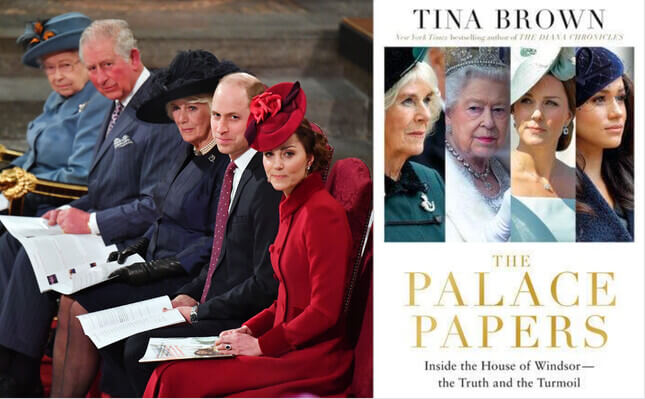Tina Brown’s ‘The Palace Papers’ Is Proof The Royal Family Needs a Reality Show
The journalist's new book, out on Tuesday, follows the happenings (and notable scandals) of the royal family in the wake of Princess Diana's death.
BooksEntertainment

Some families just have such a flair for drama that they were born to be on television. In America, that’s clearly the Kardashian-Jenners; in England, it’s most definitely the Windsors. While we’ve never been gifted a Keeping Up With The Kardashians-type show to follow the royal family, we do have a scripted series, The Crown, and now a tea-spilling book: Tina Brown’s The Palace Papers.
In a meaty follow-up to her 2007 work, The Diana Chronicles, Brown provides an in-depth look into what the royals have been up to since Princess Diana’s death in 1997. Each chapter provides a snapshot of a certain royal relationship and/or moment in time that has had cataclysmic impact on the family over the last 25 years. Part One focuses on the people within the royal family and the ever-changing dynamics between certain members. Brown waxes poetic about Charles and Camilla’s love affair before giving readers a play-by-play of Camilla’s evolution in the public eye, the Queen’s Golden Jubilee, the deaths of the Queen’s sister Margaret and their mother, and the changes brought on by the turn of the millennium.
The latter half of the book offers more of the salacious bits, as Brown breaks down nearly every scandal the royals have faced in recent years and delves into the relationships of the younger generation of royals (i.e. Will and Kate, Harry and Megan). Some of those dramas, which are not few or far between, include how the British press wickedly targeted the royals; Prince Andrew’s disgusting exploits with sex offender Jeffrey Epstein; and, of course, Meghan Markle leaving the royal portrait nearly as quickly as she entered it and alleging racist treatment.
Brown masterfully leads us into and around the fishbowl that is the modern monarchy, offering a plethora of quotes, dishy asides overheard at in-crowd parties, colorful observations and more. Jezebel sat down with Brown ahead of The Palace Papers release on Tuesday to discuss the book, its many subjects, and the future of the monarchy.
This interview has been condensed and edited for clarity.
Jezebel: The book ruminates a lot on the monarchy being out of touch, particularly since Meghan Markle entered the picture and as the Queen gets older. You seem relatively optimistic about the future of The Firm, when the Queen passes and King Charles takes the throne. Do you think it will maintain the influence it once had in the Elizabethan era?
Tina Brown: Well, I think the monarchy will survive. I think it’s a thousand year old institution. It managed to survive Henry VIII beheading two of his wives. I mean, despite the tarnishing of it in recent years, I do think it will survive, but it’s going to have to evolve and change, and I don’t think it will have quite the global stature that it has had with Queen Elizabeth II. Seventy years on the throne, living through everything she’s lived through. Fourteen prime ministers, starting with Winston Churchill. It’s inevitable that anyone who follows will seem lesser than she, but there will be a role for the monarchy. I think that they’re lucky, actually, after Charles, to have William and Kate, because I think that they are willing to do this incredibly challenging, dutiful role while being modern people who people can identify with. So, yes, I am more optimistic than some.
J: You speak about Will and Kate’s charisma in the book. What do you think that’s going to bring to the monarchy in the modern era that we’re maybe not seeing now?
TB: Well, they have a difficult role to play, quite honestly, because everybody wants them to be glamorous and exciting. And yet at the same time, if they’re too exciting, nothing good comes of it. And everybody likes to read about Meghan and Harry, but are you sure you’d want to have Harry as king? I don’t think so. So, we mustn’t forget that Queen Elizabeth didn’t succeed over 70 years by being exciting and glamorous, because she succeeded by absolute sort of solidity of purpose, being discreet, being stoic. And even though these seem like out-of-date adjectives, I still believe that they are essentially the core of what the monarchy does need to be. Those qualities in life are sometimes considered boring, but they weather very well as the years go by.
-

-

-

-

-

-

-

-

-

-

-

-

-

-

-

-

-

-

-

-

-

-

-

-

-

-

-

-

-

-

-

-

-

-

-

-

-

-

-

-








































